
Introduction:
In recent years, the cryptocurrency market has experienced a meteoric rise, captivating the attention of investors and businesses worldwide. However, a peculiar trend has emerged as banks around the globe have begun banning credit card transactions involving cryptocurrencies. This article delves into the reasons behind this decision, exploring the potential risks and implications it poses for both consumers and the financial industry.
1. The Risk of High Volatility:
One of the primary reasons banks have banned credit card cryptocurrency transactions is the high volatility associated with digital currencies. Cryptocurrencies, such as Bitcoin and Ethereum, are known for their rapid price fluctuations, which can lead to significant gains or losses in a short period. By restricting credit card transactions, banks aim to mitigate the risk of customers incurring substantial debt due to sudden market crashes.
2. Compliance and Regulatory Challenges:
Banks operate under strict regulatory frameworks that require them to adhere to anti-money laundering (AML) and know-your-customer (KYC) policies. Cryptocurrency transactions can be difficult to track and monitor, making it challenging for banks to fulfill these regulatory requirements. By banning credit card transactions involving cryptocurrencies, banks can ensure they remain compliant with existing laws and regulations.
3. Concerns Regarding Money Laundering and Illicit Activities:
Cryptocurrencies have been associated with money laundering, terrorist financing, and other illicit activities. Banks, as financial institutions, have a responsibility to prevent such activities from occurring within their networks. By restricting credit card transactions involving cryptocurrencies, banks can reduce the risk of facilitating illegal activities and maintain their reputation as trustworthy financial entities.
4. Security and Fraud Risks:
Cryptocurrency transactions are typically conducted online, making them vulnerable to hacking and fraudulent activities. By banning credit card transactions involving cryptocurrencies, banks can protect their customers from falling victim to cyber attacks and financial fraud. Additionally, banks can focus their resources on enhancing the security of traditional payment methods, which are generally more established and regulated.
5. The Potential for Market Manipulation:
The decentralized nature of cryptocurrencies makes them susceptible to market manipulation. By prohibiting credit card transactions involving cryptocurrencies, banks can reduce the likelihood of customers participating in potentially fraudulent activities aimed at manipulating the market.
6. The Shift Towards Digital Payments:
As the world continues to transition towards digital payments, banks are facing increased competition from fintech companies and digital wallet providers. By banning credit card cryptocurrency transactions, banks can maintain their competitive edge by focusing on established payment methods and ensuring customer trust.
FAQs:
1. Q: Will this ban affect all credit card transactions involving cryptocurrencies?
A: The ban primarily affects credit card transactions where cryptocurrencies are used as a medium of exchange. However, it may not apply to other forms of cryptocurrency-related transactions, such as buying and selling cryptocurrencies through exchanges.
2. Q: Are there any alternative payment methods available for purchasing cryptocurrencies?
A: Yes, there are various alternative payment methods available, including bank transfers, cryptocurrency exchanges, and digital wallet providers. These options allow users to purchase cryptocurrencies without relying on credit cards.
3. Q: Will the ban impact the growth of the cryptocurrency market?
A: The ban may temporarily slow down the growth of the cryptocurrency market, particularly in regions where credit card usage is prevalent. However, the long-term impact remains uncertain, as the market continues to evolve and adapt to regulatory challenges.
4. Q: Are there any regulations being proposed to address the concerns surrounding credit card cryptocurrency transactions?
A: Yes, regulatory authorities worldwide are actively working on developing guidelines and regulations to address the concerns surrounding credit card cryptocurrency transactions. These regulations may aim to strike a balance between fostering innovation and protecting consumers from potential risks.
5. Q: Will banks eventually allow credit card transactions involving cryptocurrencies in the future?
A: The future of credit card cryptocurrency transactions remains uncertain. While some banks may reconsider their stance in the future, others may continue to impose restrictions due to the ongoing risks and regulatory challenges. It is essential for customers to stay informed about the evolving landscape of financial services.